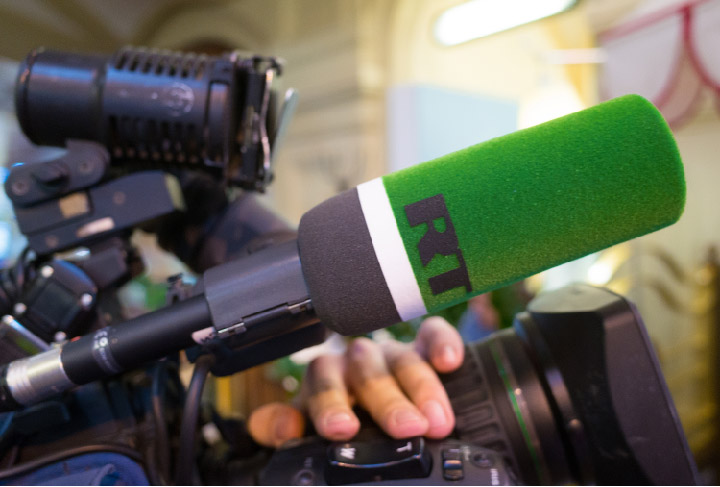Russia
Last week, Russian officials and state media focused on the surging gas prices in Europe, which some EU politicians have said stems from Russia manipulating the gas market to speed up the launch of the Nord Stream 2 pipeline. State-backed outlets amplified claims from Russian President Vladimir Putin that the gas crisis was caused by the EU’s efforts to curtail long-term contracts with Kremlin-controlled energy firms. Russian state media also elevated arguments that the high gas prices were caused by the EU’s push toward renewable energy. A 2010 video of Putin joking about Europe’s energy transition—he famously quipped, “What are they going to warm up with… firewood?”—gained significant traction on Twitter after being posted by RT en Espanol (among others). Russian officials and state-funded outlets used the gas shortage to argue that Nord Stream 2 could “play a crucial role in stabilizing the European gas market.”
Kremlin-funded media also devoted a large amount of coverage to the hours-long crash of Facebook and several of its affiliated apps. Some of the most engaged with content related to an unconfirmed and likely false claim made anonymously weeks earlier that the personal data of 1.5 billion Facebook users was being sold on a hacker forum. There was limited coverage of Facebook’s less dramatic second run-in with technical issues last week.
Finally, Russian officials and state-controlled media focused some attention on elections in the Czech Republic and Austrian Chancellor Sebastian Kurz’s resignation. Ahead of the Czech elections, Kremlin-linked outlets highlighted corruption allegations levied by investigative reporters against incumbent Prime Minister Andrej Babis, while also criticizing his management of the pandemic and the economy. Babis narrowly lost the election. Kurz’s resignation was also related to corruption charges, which RT and others covered factually. Ruptly shared videos of demonstrations against Kurz. Russia’s Foreign Ministry avoided weighing in, calling Kurz’s resignation an internal matter.
China
Due to the week-long celebration of China’s National Day last week, Chinese diplomats and state media were largely focused on promoting positive narratives about China, including heavy promotion of CCP-produced white papers on China’s climate commitments and poverty eradication efforts. There was also significant coverage of last Wednesday’s meeting between U.S. National Security Advisor Jake Sullivan and his Chinese counterpart, Yang Jiechi, in Zurich, Switzerland. Chinese diplomats and state media presented the meeting as an opportunity for both countries to put the Sino-American relationship “back on the right track.” Chinese diplomats in Beijing, Australia, India, and beyond all described the talks as “candid” and emphasized the renewed goodwill from China to mend diplomatic relations. Several Chinese state media outlets and their employees also painted the meeting in a positive light. But news that U.S. special forces have been secretly training Taiwan’s military for years and the CIA’s announcement that it was forming a new China-focused unit were, predictably, met with indignation from Beijing. The Chinese ambassador to the United States accused Washington of resorting to “the Cold War playbook, travestied from 007 movies,” a quip that was dutifully amplified by Xinhua, CGTN, and the Global Times. On the issue of Taiwan reunification, President Xi Jinping’s warning that “complete reunification” would soon be realized was relayed by state media as well as by Chinese diplomats in Cuba, India, and Italy. At the same time, Chinese diplomats at the United Nations accused the United States of creating an “imaginary enemy” to upgrade its own nuclear arsenal.
This follows the Chinese Ministry of Foreign Affairs’ repeated accusations about the threat of nuclear proliferation related to the AUKUS agreement. Xinjiang was also once again among the five most discussed topics by monitored Chinese accounts on Twitter. The top performing tweets related to the region included Ministry of Foreign Affairs spokesperson Zhao Lijian showcasing “dance battles” and “children playing” to counter accusations of forced labor, and diplomats in Lebanon and Italy seeking to discredit Uighur testimony about China’s actions in the region.
Iran
Iranian diplomats last week condemned the attack on a Shia mosque in Kunduz, Afghanistan, that killed at least 50 worshippers. The Islamic State Khorosan group (IS-K) claimed responsibility for the attack. Supreme Leader Ali Khamenei called Afghanistan a “neighboring and fraternal country” and called on the Taliban to bring the perpetrators to justice. Former president Hassan Rouhani used a sterner tone, demanding that the Taliban “be held responsible for the security of the Afghan people.” But President Ebrahim Raisi shifted blame to the United States, which he claimed “backed and planned” the Islamic State’s growth in Afghanistan.
Iran’s Foreign Minister Hussein Amir-Abdollahian visited Moscow as a guest of Russian Foreign Minister Sergei Lavrov. The delegation’s visit was widely covered by the Iranian press, and Amir-Abdollahian praised the talks in English on Twitter, identifying Afghanistan, the Caucuses, Syria, Yemen, and the JCPOA as specific issues on which there should be close coordination between Russia and Iran. Other government-linked accounts cast possible Israeli-Azerbaijani security cooperation as a situation that required coordination between Russia and Iran to manage. Amir-Abdollahian also visited Lebanon, where he met with civilian leaders, like President Michel Aoun, Speaker Nabih Berri, Prime Minister Najib Mikati, and Foreign Minister Abdallah Bou Habib. He also met with Hassan Nasrallah, head of Hezbollah, the Shia militia that wields tremendous power in the country. This visit comes on the heels of a delivery of Iranian fuel that arrived in the economically devastated country last month, in violation of sanctions against Syria and Hezbollah.
The views expressed in GMF publications and commentary are the views of the author alone.








